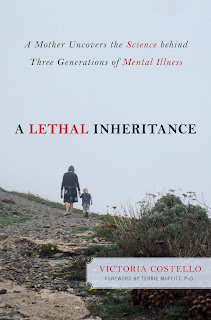I recently had the opportunity to read Victoria Costello’s new book, A Lethal Inheritance: A Mother Uncovers the Science behind Three Generations of Mental Illness. As I mentioned in her guest post, Costello is a noted science journalist and author of several books focusing on psychology and parenting. Perhaps equally important, however, is the fact that she is the mother of two boys (now adults) who have struggled with mental illness, as has she. The book is her memoir of her family’s experience with major mental illness, including schizophrenia and depression, but it’s also so much more than that. As she and her sons experience emotional and psychological ups and downs, find treatment, and eventually stabilize, Costello also recounts her discovery of a genetic predisposition towards mental illness in her family tree. Using her family as a case study, Costello is able to accomplish two notable things with this book that I think make it applicable and compelling to almost any reader.
First, she weaves relevant aspects of mental health research into the narrative in a seamless and captivating way. Many times books that try to recount scientific information or studies do so in a rather dry way, but Costello is able to incorporate a lot of research into her story in a way that makes you even more interested in the topic. Some of the most fascinating research discussed in the book is that of gene-environment interactions. The idea that aspects of your environment (e.g., stress, exposure to certain substances or events) can actually influence how or if a gene you have in your DNA is expressed is so interesting and complex. One example of this type of research is focusing on adolescent marijuana use and the risk of psychotic symptoms. It turns out that quite a bit of research has shown that marijuana use increases the risk of psychotic symptoms in all adolescents, but for those with a genetic predisposition to mental health problems, it increases the risk dramatically. Of course, many adults and adolescents may not know if they have a genetic predisposition to mental illness, but I think this is still the type of scientific research that the public needs to know.
Costello explains many of these types of gene-environment interactions in order to illustrate factors that put individuals at risk for mental illness, particularly those with a genetic predisposition.

.jpg)
Leave a Reply